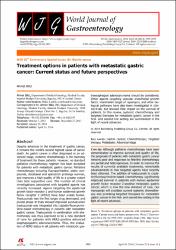| dc.contributor.author | Bilici, Ahmet | |
| dc.date.accessioned | 10.07.201910:49:13 | |
| dc.date.accessioned | 2019-07-10T20:04:39Z | |
| dc.date.available | 10.07.201910:49:13 | |
| dc.date.available | 2019-07-10T20:04:39Z | |
| dc.date.issued | 2014 | en_US |
| dc.identifier.citation | Bilici, A. (2014). Treatment options in patients with metastatic gastric cancer: Current status and future perspectives. World Journal of Gastroenterology, 20(14), 3905-3915. https://dx.doi.org/10.3748/wjg.v20.i14.3905 | en_US |
| dc.identifier.issn | 1007-9327 | |
| dc.identifier.issn | 2219-2840 | |
| dc.identifier.uri | https://dx.doi.org/10.3748/wjg.v20.i14.3905 | |
| dc.identifier.uri | https://hdl.handle.net/20.500.12511/4086 | |
| dc.description | WOS: 000334439200015 | en_US |
| dc.description | PubMed ID: 24744580 | en_US |
| dc.description.abstract | Despite advances in the treatment of gastric cancer, it remains the world's second highest cause of cancer death. As gastric cancer is often diagnosed at an advanced stage, systemic chemotherapy is the mainstay of treatment for these patients. However, no standard palliative chemotherapy regimen has been accepted for patients with metastatic gastric cancer. Palliative chemotherapy including fluoropyrimidine, platin compounds, docetaxel and epirubicin prolongs survival, and improves a high quality of life to a greater extent than best supportive care. The number of clinical investigations associated with targeted agents has recently increased. Agents targeting the epidermal growth factor receptor 1 and human epidermal growth factor receptor 2 (HER2) have been widely tested. Trastuzumab was the first target drug developed, and pivotal phase. trials showed improved survival when trastuzumab was integrated into cisplatin/ fluoropyrimidine-based chemotherapy in patients with metastatic gastric cancer. Trastuzumab in combination with chemotherapy was thus approved to be a new standard of care for patients with HER2-positive advanced esophagogastric adenocarcinoma. Thus, the evaluation of HER2 status in all patients with metastatic gastroesophageal adenocarcinoma should be considered. Other agents targeting vascular endothelial growth factor, mammalian target of rapamycin, and other biological pathways have also been investigated in clinical trials, but showed little impact on the survival of patients. In this review, systemic chemotherapy and targeted therapies for metastatic gastric cancer in the first- and second-line setting are summarized in the light of recent advances. (C) 2014 Baishideng Publishing Group Co., Limited. All rights reserved. | en_US |
| dc.language.iso | eng | en_US |
| dc.publisher | Baishideng Publishing Group | en_US |
| dc.rights | info:eu-repo/semantics/openAccess | en_US |
| dc.subject | Gastric Cancer | en_US |
| dc.subject | Chemotherapy | en_US |
| dc.subject | Targeted Therapy | en_US |
| dc.subject | Metastasis | en_US |
| dc.subject | Advanced-Stage | en_US |
| dc.title | Treatment options in patients with metastatic gastric cancer: Current status and future perspectives | en_US |
| dc.type | article | en_US |
| dc.relation.ispartof | World Journal of Gastroenterology | en_US |
| dc.department | İstanbul Medipol Üniversitesi, Tıp Fakültesi, Dahili Tıp Bilimleri Bölümü, İç Hastalıkları Ana Bilim Dalı | en_US |
| dc.identifier.volume | 20 | en_US |
| dc.identifier.issue | 14 | en_US |
| dc.identifier.startpage | 3905 | en_US |
| dc.identifier.endpage | 3915 | en_US |
| dc.relation.publicationcategory | Makale - Uluslararası Hakemli Dergi - Kurum Öğretim Elemanı | en_US |
| dc.identifier.doi | 10.3748/wjg.v20.i14.3905 | en_US |
| dc.identifier.wosquality | Q2 | en_US |
| dc.identifier.scopusquality | Q1 | en_US |


















